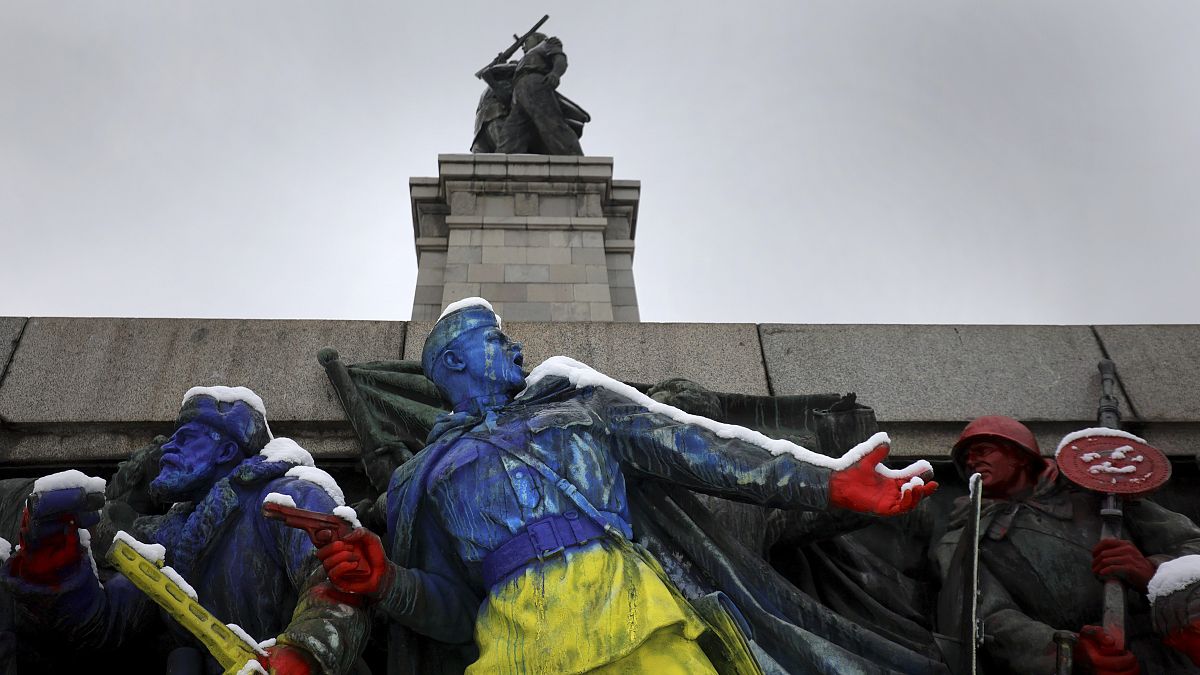Rumen Sarandev couldn't offer his house to those fleeing the bloodshed - so he offered his car.
Confronted with scenes of desperate Ukrainians fleeing their homes amid the Russian invasion, Rumen Sarandev wanted to do what he could. He did not have a home to offer the refugees from the north, but he did have a car. So he drove north, towards Romania and Ukraine.
Leaving the Bulgarian town of Dobrich, Sarandev and a convoy of seven cars and three vans drove to Issacea on the Romanian border. From there, he offered Ukrainian refugees fleeing into Romania a lift to anywhere they wanted to go.
“I saw mothers with children running away, so I wanted to help. I can't provide shelter to those in need, but at least I can help with the transportation,“ he told Euronews.
Others in Bulgaria were able to offer shelter. Dobromir Dimitrov said he was offering between 10 and 12 people accommodation in his apartment in Sofia and his house in Berkovitsa.
“Our compatriots in Ukraine, as well as ordinary Ukrainian citizens, do not deserve this fate, they have nothing to do with the political battles between the two countries. Each and every one of us here must be ready to support them,” Dimitrov said.
Bulgarian and Ukrainian people have always been close. They are not only brought closer by their common Slavic origin and language, but also by their common historical destiny and centuries-old relations in religious, cultural, economic, and socio-political life.
The Bulgarian diaspora in Ukraine is one of the largest in the country, between 200,000 and 500,000 people and a number of newspapers and magazines in Ukraine are published in Bulgarian. TV stations also broadcast in Bulgarian in areas with large communities.
As such, Russia's invasion of Ukraine caused a wide public reaction in Bulgaria. On the first day of the military incursion, the Bulgarian parliament issued a joint position condemning the Russian actions and allowing the government to support the sanctions that the international community imposed on Moscow.
Although the government in Bulgaria is trying to show unity over the invasion, divisions have begun to emerge between Bulgarians who condemn the invasion and Bulgarians who support it out of a sense of nostalgia for the country’s Soviet past.
Despite pro-Russian sentiment that has been reported in the Bulgarian society over the years, recent polls show it is on the wane.
Polls show that over 48% of Bulgarians disapprove of Russian President Vladimir Putin, while 30% approve. Over 63% of Bulgarians approve of EU countries uniting for tougher sanctions against Moscow, and over 46% agree with paying higher utility bills that will come as a result of economic sanctions against Russia, according to an Alpha Research poll.
But politics aside, Bulgarians have raised funds to be sent to those in need in Ukraine and the Bulgarian Red Cross has launched a fundraising campaign for humanitarian aid to help those in distress. Over 550 thousand Bulgarian levs - approximately €225 000 - were collected within the first two days of the Bulgarian Red Cross charity campaign.
Bulgarian hotels along the Black Sea coast have opened their doors to Ukrainian refugees coming to the country.
Veselin Nalbantov, who is the deputy chairman of one of the largest hotel organisations in Bulgaria, made the base of his hotel in the tourist village of Sunny Beach available for the accommodation of Ukrainian refugees.
But hotel owners are starting to experience financial difficulties as they are running out of money to support the refugees. By a decision of the Bulgarian Council of Ministers, hoteliers who allow Ukrainian refugees to be accommodated in their facilities will receive financial support from the state.
“People shouldn’t think that there is some huge profit for us hoteliers. No, we just want to help. And helping should not be done on a competitive basis, meaning whoever offers the lowest price receives the refugees and the state aid. This is a decision that must be taken solely by the government,” Nalbantov added.
Meanwhile, one of the largest foreign investors in Bulgaria, Franco Mirolio, has offered work and shelter to 1,000 fleeing Ukrainian citizens.
Mirolio's wife is Ukrainian and he said the idea to help them came naturally.
“We believe that people in this situation need support as well as to feel part of our society,” he said.
